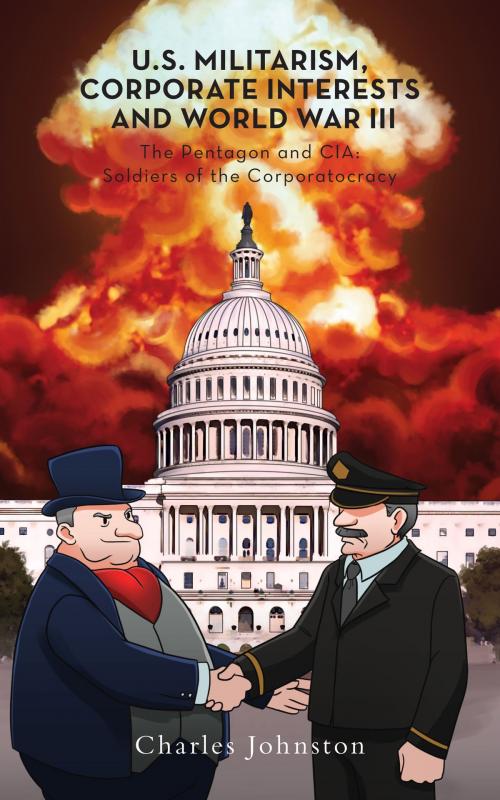U.S. Militarism, Corporate Interests and World War III
The Pentagon and CIA: Soldiers of the Corporatocracy
Nonfiction, Social & Cultural Studies, Political Science, Politics, Practical Politics, History| Author: | Charles Johnston | ISBN: | 9781773024219 |
| Publisher: | Tellwell Talent | Publication: | January 16, 2017 |
| Imprint: | Tellwell Talent | Language: | English |
| Author: | Charles Johnston |
| ISBN: | 9781773024219 |
| Publisher: | Tellwell Talent |
| Publication: | January 16, 2017 |
| Imprint: | Tellwell Talent |
| Language: | English |
Flanked on the east and west by the world’s two largest oceans, the United States has needed little more for its territorial defense. Nonetheless, the U.S. military had early expanded far beyond what was needed to insure security from external threats. Concomitant with the rapid growth of U.S. industry the military forcefully facilitated commercial agreements and resource capture in distant locations during the 1800s.
The annexation of Hawaii was achieved through regime change; a plantation owners’ coup against the legitimate king. The Spanish-American War (1898) was sold to the American public as a noble effort to rescue the Cuban people from the oppressive rule of Imperialist Spain. The real goals were sugar, tobacco, coffee and the other resources of Cuba, Philippines, Puerto Rico and Guam. American control of Central American fruit plantations and mining operations was maintained by the U.S. Marines. The Panama Canal was built after the U.S. militarily instigated the partition of the new country of Panama from Columbia. The latter would not ratify a canal-zone lease in perpetuity. Similarly, dozens of other early and commercially motivated military operations took place in Asia, Latin America and Oceania.
The same types of commercial goals continue today – internationally the Pentagon and paramilitary CIA operate for the purpose of serving the corporatocracy. Business interests rule the realm and direct foreign policy. Propagandistic references to saving “freedom and democracy” through intervention are now trite efforts to mask the less noble objectives of corporate profits. Resources and foreign governments favorable to the unimpeded operation of corporations have been the primary objectives. Wars and clandestine coups have been endlessly directed against socialism - the public ownership of the principal and essential means of production of goods and services. Public ownership – anywhere in the world - is antithetical to big business goals and militarily opposed by the Washington corporatocracy.
The long and enduring role of the U.S. military and paramilitary in supporting international corporate operations has withstood the test of time and is not prone to corrective change. It will continue, irresponsibly and recklessly pursued in an armed and nuclear tipped world. Extended over a long enough period of time catastrophic consequences would seem a certainty.
Flanked on the east and west by the world’s two largest oceans, the United States has needed little more for its territorial defense. Nonetheless, the U.S. military had early expanded far beyond what was needed to insure security from external threats. Concomitant with the rapid growth of U.S. industry the military forcefully facilitated commercial agreements and resource capture in distant locations during the 1800s.
The annexation of Hawaii was achieved through regime change; a plantation owners’ coup against the legitimate king. The Spanish-American War (1898) was sold to the American public as a noble effort to rescue the Cuban people from the oppressive rule of Imperialist Spain. The real goals were sugar, tobacco, coffee and the other resources of Cuba, Philippines, Puerto Rico and Guam. American control of Central American fruit plantations and mining operations was maintained by the U.S. Marines. The Panama Canal was built after the U.S. militarily instigated the partition of the new country of Panama from Columbia. The latter would not ratify a canal-zone lease in perpetuity. Similarly, dozens of other early and commercially motivated military operations took place in Asia, Latin America and Oceania.
The same types of commercial goals continue today – internationally the Pentagon and paramilitary CIA operate for the purpose of serving the corporatocracy. Business interests rule the realm and direct foreign policy. Propagandistic references to saving “freedom and democracy” through intervention are now trite efforts to mask the less noble objectives of corporate profits. Resources and foreign governments favorable to the unimpeded operation of corporations have been the primary objectives. Wars and clandestine coups have been endlessly directed against socialism - the public ownership of the principal and essential means of production of goods and services. Public ownership – anywhere in the world - is antithetical to big business goals and militarily opposed by the Washington corporatocracy.
The long and enduring role of the U.S. military and paramilitary in supporting international corporate operations has withstood the test of time and is not prone to corrective change. It will continue, irresponsibly and recklessly pursued in an armed and nuclear tipped world. Extended over a long enough period of time catastrophic consequences would seem a certainty.















